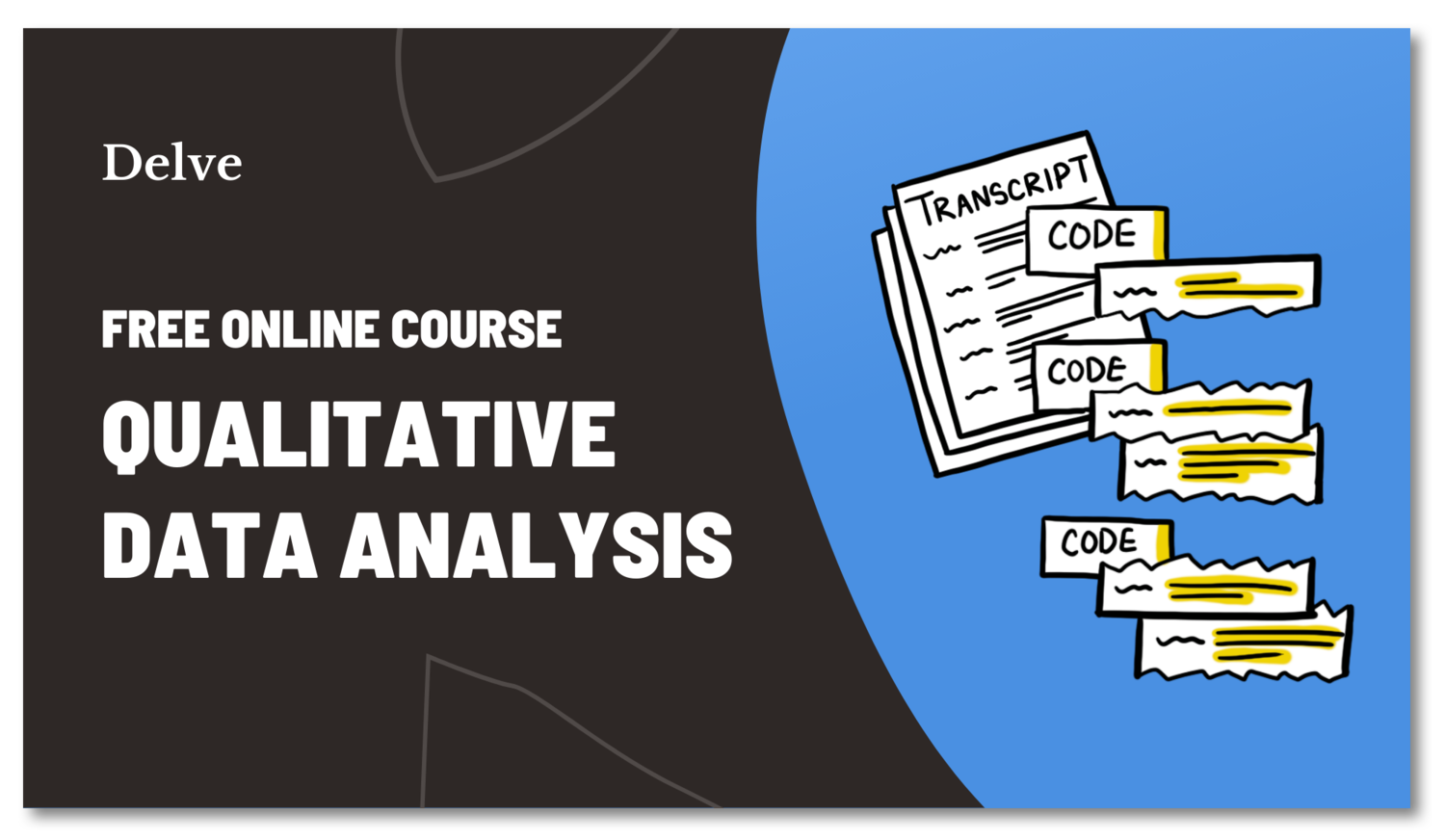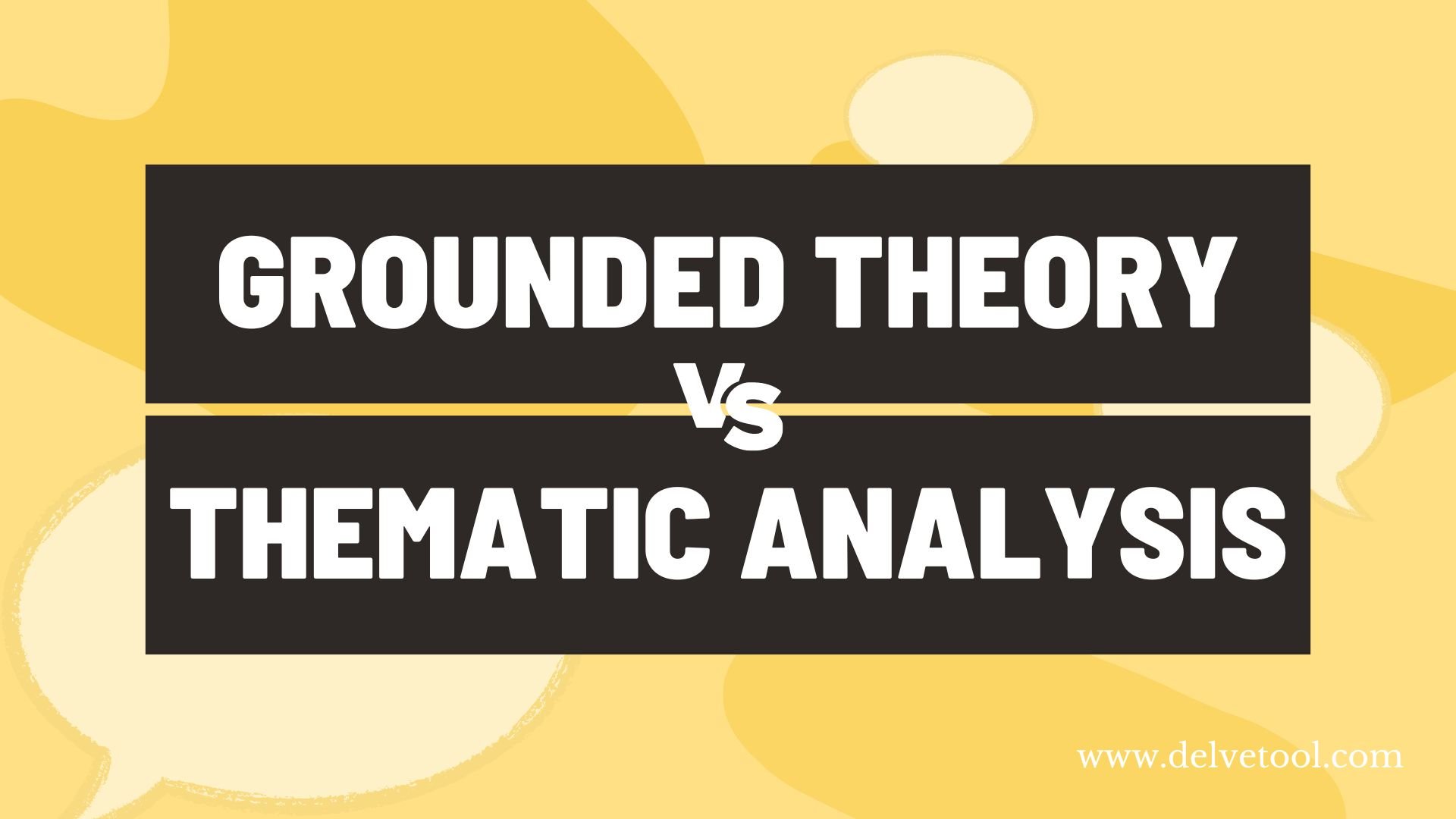Grounded Theory vs. Thematic Analysis: What's the Difference?
Grounded theory and thematic analysis are two popular qualitative research methods, each with distinct differences and advantages. Understanding these differences is important because choosing one method over the other can lead to different research outcomes and insights that you learn from your data.
This article explores the strengths and differences and uses cases of these two methods.
Overview of Grounded Theory and Thematic Analysis
Grounded Theory Overview
Grounded Theory is a qualitative research approach where you develop a new theory directly from your data. You start without a preconceived theory and let the patterns in your data guide your understanding of it, not any preexisting ideas or studies. You recruit participants and collect data, often through interactive rounds of interviews or observations, and gradually build a theory based on the information you gather. This process continues until you reach a point in your theory development where no new insights come from your data. While recruiting and adding new data takes time and flexibility, it leads to thorough theory development.
→ To learn more, check out The Practical Guide to Grounded Theory.
Thematic Analysis Overview
Thematic analysis is a flexible method for identifying and interpreting patterns within data. It can be inductive, where themes are derived from the data, or deductive, where you test a preexisting theory by finding supporting evidence in the data. The process involves familiarizing yourself with the data through iterative readings, identifying initial codes, grouping these codes into overarching themes, and refining these themes to develop your final write-up. Thematic analysis is particularly valuable for gaining in-depth insights into participants' perspectives and experiences.
→ To learn more, check out How To Do Thematic Analysis.
Key Differences: Grounded Theory vs. Thematic Analysis
Understanding the differences between grounded theory and thematic analysis can help you choose the right approach for your research. Here's a detailed comparison of their scope, process, coding methods, and outcomes.
Recruiting:
Grounded Theory: Recruiting is cyclical and involves theoretical sampling. Participants are recruited in batches throughout the study based on emerging findings, allowing for the theory's iterative development.
Thematic Analysis: Recruiting typically happens once, at the beginning of the study. The analysis involves revising themes, but participant recruitment is typically not iterative.
Scope:
Grounded Theory: Covers the entire research process from data collection to theory development. This approach is useful when no existing theory adequately explains the phenomenon or when current theories are insufficient.
Thematic Analysis: Focuses on identifying and describing themes within the data. It's more of an analytical tool rather than a comprehensive methodology. This method is best for studies that identify patterns and themes without necessarily developing new theoretical frameworks.
Process:
Grounded Theory: Involves an iterative data collection and analysis cycle, including recruiting participants in batches based on findings. Researchers collect data through various means such as interviews, observations, and documents, analyze it, and then collect more data based on their findings. Using the constant comparison method, this cycle continues until theoretical saturation is reached—when new data no longer provides additional insights.
Thematic Analysis: Follows a more step by step process. Researchers start by familiarizing themselves with the data, then generate initial codes, search for themes, review and define these themes, and finally write up their findings. While some iteration exists in checking and refining themes, it is not as ingrained as grounded theory.
Coding:
Grounded Theory: Coding happens in three iterative phases: open coding (breaking down data into discrete parts), axial coding (identifying relationships among open codes), and selective coding (integrating and refining the theory). All the coding maps to one overarching core category that leads to the final theory.
Thematic Analysis: Involves coding data segments to identify patterns. Researchers generate initial codes, which are then grouped into themes. This approach is less structured than grounded theory, allowing more flexibility in developing codes and themes without the structured phases of open, axial, and selective coding.
Outcomes:
Grounded Theory: Develops a theoretical framework that explains the phenomenon being studied. It digs deep into the data to uncover underlying processes and behaviors, resulting in a comprehensive theory that can be applied to similar contexts.
Thematic Analysis: Results in a rich, detailed description of themes that highlight patterns in the data. These themes help understand key issues and experiences, clearly showing what the data reveals. This method is great for capturing the essence of participants' perspectives and the nuances of their experiences.
Notice again how grounded theory offers a robust, theory-building approach for unexplored areas, while thematic analysis provides a flexible, pattern-finding tool for more structured research. Choosing the right method depends on your goals and the depth of understanding you need from your data.
Table: Key Differences
| When to Use Grounded Theory | When to Use Thematic Analysis |
|---|---|
| When no existing theory explains your research phenomenon. | When you want to identify patterns and themes in your qualitative data. |
| When existing theories are incomplete or not specific to your study group. | Suitable for researchers new to qualitative analysis. |
| Ideal for discovering new theories, as it is an inductive method. | Useful for involving participants in the analysis process. |
When to Use Grounded Theory vs. Thematic Analysis
Choosing between grounded theory and thematic analysis comes down to your research goals and your data type. Here’s a quick guide on when to consider using each method:
Use grounded theory when you want to:
Represent real-world settings through methods like in-depth interviews and observation.
Develop theories that are tightly connected to your data, not external theories.
Have a specific strategy for maintaining structure in your analysis.
Collect and analyze data together to ensure you have enough information.
Prevent confirmation bias by following what emerges directly from the data.
Use thematic analysis when you want to:
Identify and analyze patterns and themes in your data.
Have a flexible and accessible method for beginners to use.
Involve participants in the analysis process to capture their perspectives.
Gain detailed insights into your data without necessarily developing a new theory.
Table: When To Use Grounded Theory vs. Thematic Analysis
| Aspect | Grounded Theory | Thematic Analysis |
|---|---|---|
| Recruiting | Cyclical, theoretical sampling | Once, at the beginning |
| Scope | Entire research process | Identifying and describing themes |
| Process | Iterative data collection and analysis | Linear data familiarization, coding, and theme development |
| Coding | Open, axial, and selective coding | Flexible coding, initial codes grouped into themes |
| Outcomes | Develops theoretical framework | Detailed description of themes |
Qualitative analysis doesn't have to be overwhelming.
Take Delve's free online course. → Get started here.

Thematic Analysis vs. Grounded Theory: Real-World Example
Let’s see a quick example of how these two methods can work in the field. In our example, Stacy is a graduate student who wants to study how remote learning affects student engagement in high school. She is considering either grounded theory or thematic analysis for her research. Here’s how her research might play out depending on the method she uses.
Using Grounded Theory:
Stacy begins by conducting interviews with a small group of high school students. She transcribes these interviews and starts with open coding, identifying key points related to student engagement, such as changes in motivation and participation. Later, she does another round and realizes she also needs to interview parents because this is creating a gap in her theory.
As she collects more data, she uses the constant comparison method to notice recurring patterns. She starts axial coding to link these patterns and understand broader categories, like the impact of the home environment and teacher interaction.
She continues this iterative process, conducting more interviews based on her findings and refining her categories. This additional recruiting is more time-intensive and expensive than thematic analysis because it requires adjusting recruitment strategies based on emerging data.
Eventually, she reaches theoretical saturation, where new interviews do not provide new insights. Through this method, Stacy develops a new theory about how remote learning impacts different aspects of student engagement, explaining how factors like household distractions and the lack of face-to-face interaction influence students' motivation and participation.
Using Thematic Analysis:
Stacy starts by recruiting participants and conducting one round of interviews. She then transcribes the interviews and familiarizes herself with the data. She only talks to the initial group of high school students. She uses memos and notes to record her initial impressions and potential codes.
Next, she systematically codes the data, looking for significant statements about student engagement. She groups these codes into themes like "distractions at home," "lack of social interaction," and "flexibility in learning."
Stacy reviews and refines these themes to ensure they accurately represent the data.
She then writes her findings, describing each theme in detail and providing quotes from the interviews to support her analysis.
Through her thematic analysis, Stacy identifies key issues affecting student engagement in remote learning and provides a detailed narrative of her findings in her final write-up.
Tools for Grounded Theory and Thematic Analysis Coding
Now, let's look at your options for doing grounded theory or thematic analysis. Managing numerous codes and memos can be challenging for both grounded theory and thematic analysis. Here are some approaches to coding for both of these research methods:
Coding by Hand
You can use simple tools like pen, paper, scissors, and highlighters to code by hand. Print out your transcripts, perform open coding by cutting up the transcripts into individual excerpts, and organize these papers into piles to create your codes and categories. Doing it this way allows for a hands-on approach but can become very time-consuming, especially with large data sets. Keeping track of comparisons and managing large amounts of paper can also be challenging. You also can’t collaborate with people who aren’t physically in the same space as you.
Coding Using a Word Processor
Use word processors like Microsoft Word or Google Docs to add excerpts and comments for open coding. To create categories, copy and paste excerpts labeled by category names into different documents. This digital approach helps organize your analysis but can still be cumbersome with constant copying and pasting. Tracking specific snippets or codes can also be time-consuming without a system for quickly recalling them.
Coding Using Qualitative Data Analysis Software
Qualitative coding software like Delve is designed to support both grounded theory and thematic analysis processes. It helps you keep track of excerpts and codes, organize your thoughts, and simplify the constant comparison method. The intuitive interface makes managing large data sets easy and makes it simple to compare your data. Other features, such as demographic filters and search functionality, streamline both the grounded theory and thematic analysis process, ensuring a thorough and efficient analysis.
Streamline Your Qualitative Analysis With Delve
Choosing the right research method is not easy, but managing your data can be just as challenging. Both grounded theory and thematic analysis involve handling many codes and memos, which can be difficult to manage on paper. Delve, a web-based qualitative coding tool, streamlines the process, making tracking your work easier and providing more insightful findings.
💡Delve – The Best Tool for Thematic Analysis & Grounded Theory
Both grounded theory and thematic analysis involve iterative coding and analysis processes. Delve’s web-based software supports both methods by keeping track of excerpts, codes, and memos, allowing you to organize your thoughts and manage large data sets efficiently. It ensures that your qualitative research remains organized and thorough, helping you focus on deriving meaningful insights from your data.
Customer Testimonials for Grounded Theory & Thematic Analysis:
“Delve was my first software for analyzing qualitative data from transcripts of field research interviews, and I am glad I chose it while on a tight schedule to complete my dissertation. The in-depth training course provided by Delve enabled me to quickly apply various coding options and find themes in support of grounded analysis.” - Halida D.
“Favorite features: - Intuitive especially tagging features including to merge, rename, or change hierarchy of thematic codes - Web-based tool (no need to install software onto the computer) - French and other languages can be used.” - Ariel H.
“Delve helped me to organize and code qualitative research for my doctoral dissertation. It was very easy to use and intuitive in its use. The tools I used took me from organizing my transcripts to first and second-round coding through thematic analysis.” - Lisa G.
“I wanted to complete the thematic analysis of my research results and the Delve software made the process very smooth for me.” - Kopi S.
“We were able to easily collaborate and facilitate our thematic analysis process without a steep learning curve and at a very reasonable price.” - Nate S.
Whether you're exploring grounded theory or themes through thematic analysis, Delve is your go-to tool for deeper, more efficient qualitative research.
References:
Corbin, J., & Strauss, A. (1990). Grounded theory research: Procedures, canons, and evaluative criteria. Qualitative Sociology, 13, 3-21.
Charmaz, Kathy (2006). Constructing Grounded Theory: A practical guide through Qualitative Analysis. Thousand Oaks, California: Sage.
Glaser, B. G., & Strauss, A. L. (1967). The Discovery of Grounded Theory: Strategies for Qualitative Research.
Pidgeon, N., & Henwood, K. (1997). Using grounded theory in psychological research. In N. Hayes (Ed.), Doing qualitative analysis in psychology Press/Erlbaum (UK) Taylor & Francis.
Virginia Braun & Victoria Clarke (2006) Using thematic analysis in psychology, Qualitative Research in Psychology, 3:2, 77-101, DOI: 10.1191/1478088706qp063oa
Cite This Blog Post:
Delve, Ho, L., & Limpaecher, A. (2024, July 30). Grounded Theory vs. Thematic Analysis: What's the Difference? Essential Guide to Coding Qualitative Data. https://delvetool.com/blog/grounded-theory-vs-thematic-analysis








